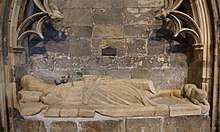James Douglas, Lord of Douglas
| Sir James Douglas | |
|---|---|

Tomb of Sir James, St Bride's Kirk, Douglas.
|
|
| Born | c. 1289 Douglas, Lanarkshire, Scotland |
| Died | 25 August 1330 (aged 40–41) Teba, Andalucia |
| Occupation | Scottish Guerrilla Leader and General, during the Wars of Scottish Independence |
| Spouse(s) | unknown |
| Children | William IV, Lord of Douglas, Archibald the Grim |
| Parent(s) | Sir William Douglas, Elizabeth Stewart, daughter of Alexander, High Steward of Scotland |
Sir James Douglas (also known as Good Sir James and the Black Douglas) (c. 1289 – 25 August 1330) was a Scottish knight and feudal lord. He was one of the chief commanders during the Wars of Scottish Independence.
He was the eldest son of Sir William Douglas, known as "le Hardi" or "the bold", who had been the first noble supporter of William Wallace (the elder Douglas died circa 1298, a prisoner in the Tower of London). His mother was Elizabeth Stewart, the daughter of Alexander Stewart, 4th High Steward of Scotland, who died circa 1287 or early 1288. His father remarried in late 1288 so Douglas' birth had to be prior to that; however, the destruction of records in Scotland makes an exact date or even year impossible to pinpoint.
Douglas was sent to France for safety in the early days of the Wars of Independence, and was educated in Paris. There he met William Lamberton, Bishop of St. Andrews, who took him as a squire. He returned to Scotland with Lamberton. His lands had been seized and awarded to Robert Clifford. Lamberton presented him at the occupying English court to petition for the return of his land shortly after the capture of Stirling Castle in 1304, but when Edward I of England heard whose son he was he grew angry and Douglas was forced to depart.
For Douglas, who now faced life as a landless outcast on the fringes of feudal society, the return of his ancestral estates was to become an overriding consideration, inevitably impacting on his political allegiances. In John Barbour's rhyming chronicle, The Brus, as much a paean to the young knight as the hero king, Douglas makes his feelings plain to Lamberton;
Sir, you see,
...
Wikipedia
